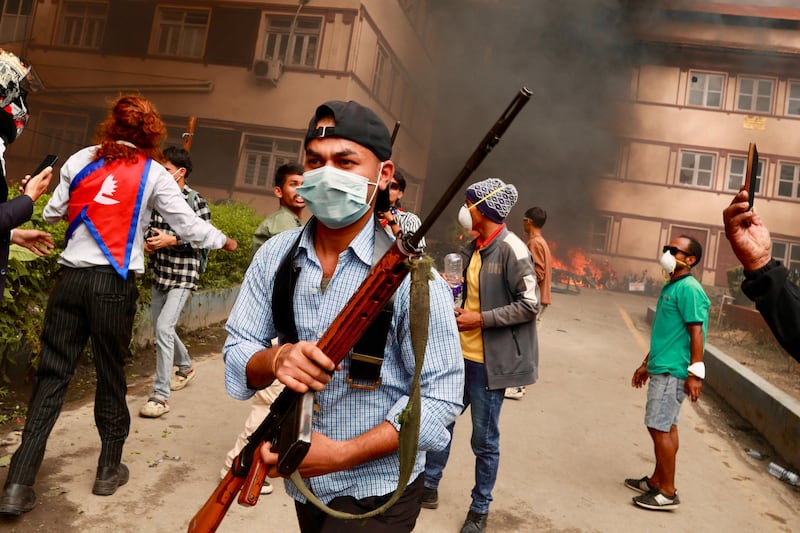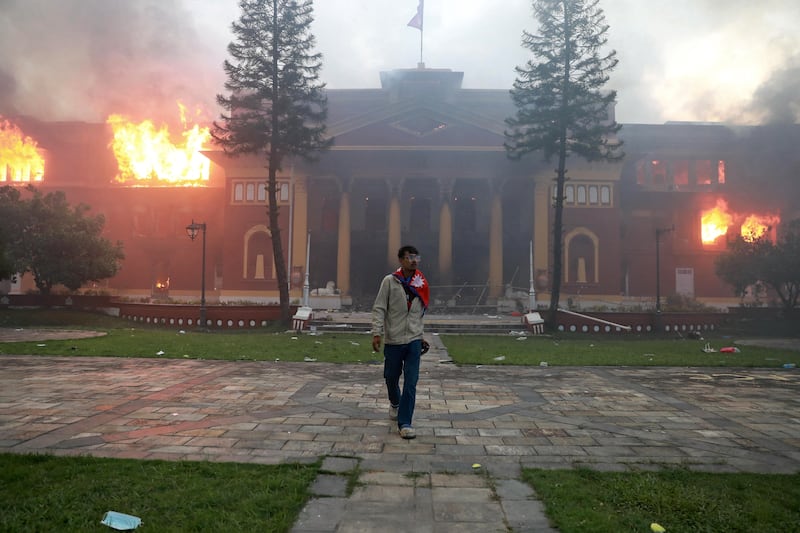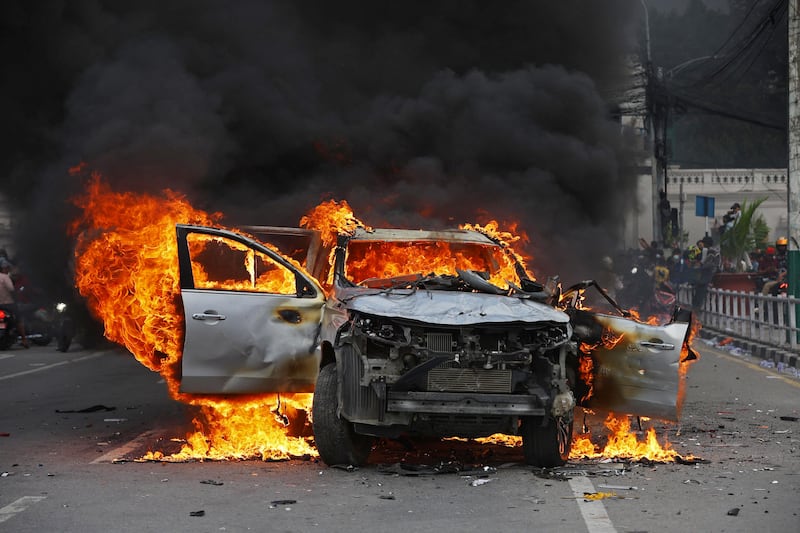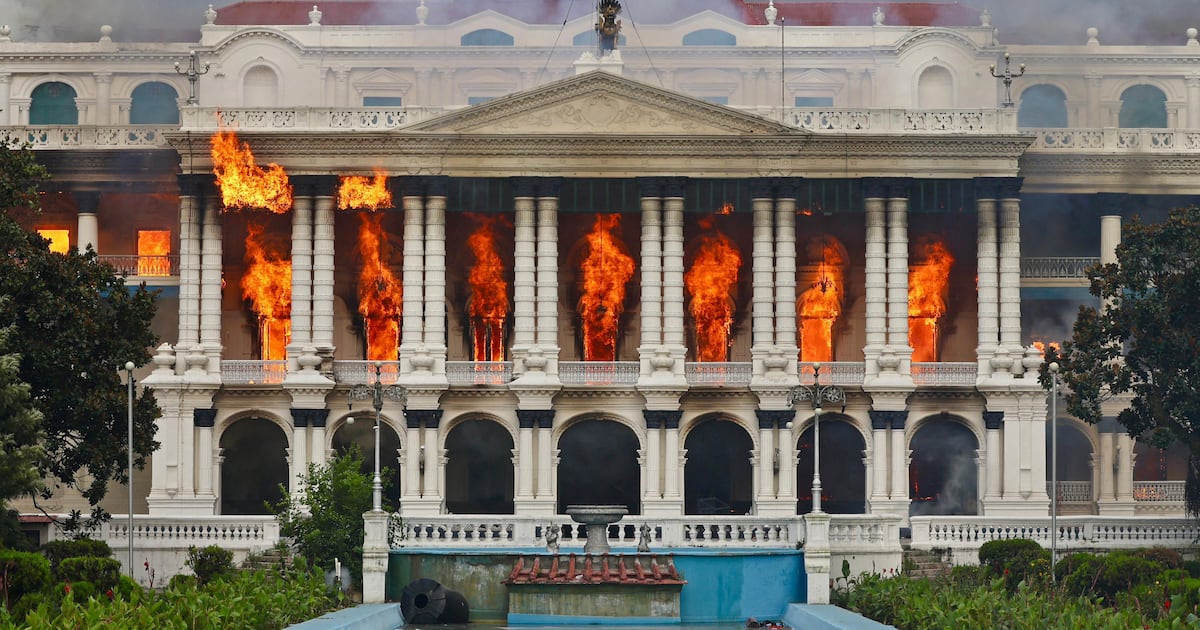Nepali prime minister K.P. Sharma Oli has been forced to resign by angry young anti-corruption protesters who defied a curfew and clashed with police, a day after 19 people died in the violence.
The outrage was sparked by a social media ban, which Mr Oli’s government lifted after police fired tear gas and rubber bullets at protesters trying to storm parliament. There were 100 people injured alongside the 19 dead.
But there was no let up in the protests on Tuesday, which plunged Nepal into fresh political uncertainty.
The unrest is the worst in decades in the poor Himalayan country, which is wedged between India and China and has struggled with political and economic instability since protests led to the abolition of its monarchy in 2008.
Young Nepalis have for years been frustrated at the lack of jobs, and millions have gone to work in the Middle East, South Korea and Malaysia, mainly on construction sites, and send money home.
“In view of the adverse situation in the country, I have resigned effective today to facilitate the solution to the problem and to help resolve it politically in accordance with the constitution,” Mr Oli said in his resignation letter to president Ramchandra Paudel.
An aide to Paudel told Reuters the president had begun the process of finding a new premier, but also summoned protest leaders for talks.
Jubilant youths entered the parliament complex on hearing the news, waving their hands in the air and shouting slogans as smoke rose from sections of the building.
Mr Oli (73) was sworn in for his fourth term in July last year as Nepal’s 14th prime minister since 2008. Two of his cabinet colleagues had resigned on “moral grounds” late on Monday.
Nepalese prime minister K.P. Sharma Oli has resigned amid a second day of street protests. File photograph: Narendra Shrestha/EPA
 A protester carries a firearm as demonstrators gather outside Nepal’s Supreme Court during a protest to condemn the police’s deadly crackdown on demonstrators in Kathmandu on Tuesday. Photograph: Prabin Ranabhat/AFP via Getty Images
A protester carries a firearm as demonstrators gather outside Nepal’s Supreme Court during a protest to condemn the police’s deadly crackdown on demonstrators in Kathmandu on Tuesday. Photograph: Prabin Ranabhat/AFP via Getty Images
Early in the day, Mr Oli called a meeting of all parties, saying violence was not in the interest of the nation and “we have to resort to peaceful dialogue to find solutions to any problem”. He did not respond directly to the protesters’ complaints about corruption.
But protesters continued gathering in front of parliament and elsewhere in the capital Kathmandu, defying an indefinite curfew.
They set fire to tyres on some roads, threw stones at police in riot gear and chased them through narrow streets.
Witnesses also said protesters were setting fire to the homes of some politicians in Kathmandu, and local media reported that some ministers had been plucked to safety by military helicopters.
The Singha Durbar area, which houses the prime minister’s office and other ministries as well as Parliament House, and Mr Oli’s private residence were also set on fire, they said.
 A man is draped in the Nepal national flag as a fire rages through the president’s office in Kathmandu on Tuesday, a day after a police crackdown on demonstrations over social media prohibitions and corruption by the government. Photograph: Anup Ojha/AFP via Getty Images
A man is draped in the Nepal national flag as a fire rages through the president’s office in Kathmandu on Tuesday, a day after a police crackdown on demonstrations over social media prohibitions and corruption by the government. Photograph: Anup Ojha/AFP via Getty Images  A car burns outside the Singha Durbar, the main administrative building of the Nepal government, in Kathmandu on Tuesday. Photograph: Prabin Ranabhat/AFP via Getty Images
A car burns outside the Singha Durbar, the main administrative building of the Nepal government, in Kathmandu on Tuesday. Photograph: Prabin Ranabhat/AFP via Getty Images
Footage circulating on social media showed former prime minister Sher Bahadur Deuba and his wife Arzu Rana, foreign minister under Mr Oli, and finance minister Bishnu Paudel being attacked by protesters.
Reuters could not immediately verify the information.
Kathmandu airport, Nepal’s main international gateway, was closed because of smoke from fires set by protesters, the Civil Aviation Authority said.
Organisers of the protests, which spread to other cities, have called them “demonstrations by Gen Z”, driven by young people’s widespread frustration with a perceived lack of action to tackle corruption and boost economic opportunities.
Young Nepalis had been posting on social media about the “luxurious lives of the families and children of corrupt politicians and civil servants” until the government clamped down on the platforms, the email said.
Last week, Oli’s government blocked access to several online platforms for allegedly failing to register with the government, saying social media were being used to spread disinformation and commit fraud. — Reuters
